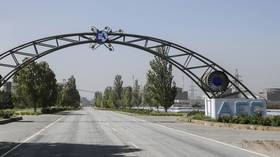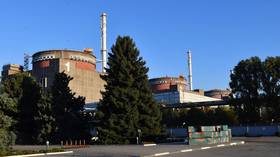Ukrainian attacks risk ‘nuclear disaster’ – Rosatom

Renewed Ukrainian artillery strikes on the Zaporozhye nuclear power plant (ZNPP) have created a risk of a nuclear disaster, Rosatom director-general Alexey Likhachev told reporters on Monday.
Moscow has called on the International Atomic Energy Agency to publicly admit Kiev is bombing the facility and call for an end to the attacks.
“We were in talks with the IAEA all night,” Likhachev told reporters during the Atomexpo-2022 in Sochi. After a “relatively calm” period since September, at least 30 projectiles struck the facility over the weekend, damaging the backup generators and the spent fuel storage facility, he added.
Europe’s largest nuclear power plant has been under control of Russian troops since February 28. While the reactor blocks are strong enough to withstand shelling, damaging the spent fuel containers risks a release of radioactive material into the atmosphere, with unpredictable consequences.
The Ukrainian military has repeatedly targeted the facility with Western-supplied artillery, while claiming Russia was staging “false flag” incidents to make Kiev look bad. The Ukrainian general staff eventually admitted to striking the area around the ZNPP, however.
The weekend attacks amounted to the first major incident since the IAEA established a permanent observation mission at the ZNPP in early September. On Sunday, IAEA Director-General Mariano Grossi called for an immediate end to the shelling, saying that the world “got lucky” that a “serious nuclear incident” did not happen this time. However, he once again did not name the culprit.
On Monday, both the Kremlin and the Foreign Ministry called on the IAEA to do its duty to the fullest and identify those responsible for the shelling.
IAEA specialists completed their inspection of the facility on Monday afternoon and sent their report to headquarters, Likhachev’s top aid Renat Karchaa told Russia’s Channel 1 TV.
“They were accompanied by a highly qualified ballistics specialist we provided, and once again it was convincingly shown that the origin of these artillery strikes was Marganets,” a city in the Ukrainian-held Dnepropetrovsk region, Karchaa said.
Karchaa also told reporters that Rosatom was “taking steps” to fortify the spent fuel storage facility and other parts of the ZNPP, though he did not offer any details.













